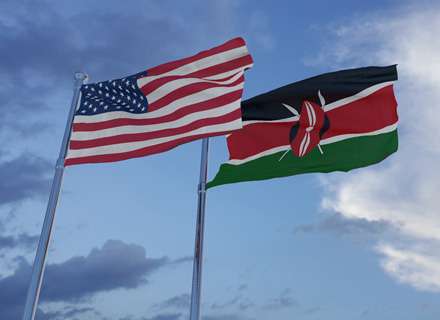Kenya expresses concerns over lack of transparency in US trade negotiations
At the heart of Kenya’s concerns is the issue of transparency. The Kenyan government has accused the US of pursuing opaque negotiations that favour government stakeholders and exclude other concerned parties. To address this issue, Kenya has called for the US to adopt a more open approach to negotiations, including the public release of negotiating texts and the announcement of negotiation rounds in advance to allow for broad public stakeholder engagement in both countries.
- Advertisement -
The recent negotiations between the United States (US) and Kenya on the proposed Strategic Trade and Investment Partnership (STIP) have been fraught with tension and discord. While the Kenyan government has been keen to pursue an equitable partnership that benefits both countries, it has expressed concerns over the lack of transparency and good faith shown by the US in the negotiations thus far.
At the heart of Kenya’s concerns is the issue of transparency. The Kenyan government has accused the US of pursuing opaque negotiations that favour government stakeholders and exclude other concerned parties. To address this issue, Kenya has called for the US to adopt a more open approach to negotiations, including the public release of negotiating texts and the announcement of negotiation rounds in advance to allow for broad public stakeholder engagement in both countries. Furthermore, Kenya has requested that all related materials and consolidated texts be published in a timely manner after each round of negotiations to enable the public to review and comment on each proposal before the agreement is finalized.
- Advertisement -
While the US has expressed its good intentions in these negotiations, Kenya remains sceptical of its commitment to transparency and inclusivity. Kenya has pointed to its own record of transparency in negotiations, citing the example of the East African Community/European Union Economic Partnership Agreement (EAC/EU EPA), where it made the negotiating texts available to all stakeholders under the Kenya Post-Lomé Trade Program (KEPLOTRADE). Kenya has called on the US to follow suit and demonstrate its commitment to equitable partnership by adopting a more transparent approach to negotiations.
- Advertisement -
Another key issue in the STIP negotiations is the scope of the agreement. Kenya has expressed concerns over the inclusion of provisions affecting agriculture in the STIP, arguing that these provisions could restrict Kenya’s agricultural regulatory or policy space. Similarly, Kenya has opposed the inclusion of a digital trade chapter, stating that such provisions should not restrict Kenya’s regulatory or policy space, including customs duties on electronic transmissions, digital services taxes, data flows, electronic authentication and signatures, source code and algorithms, non-discriminatory treatment of digital products, and interactive computer services. Kenya has also expressed opposition to the inclusion of good regulatory practices provisions that could impose onerous requirements on the country’s regulatory processes.
- Advertisement -
Kenya’s concerns over the scope of the agreement reflect its desire to protect its sovereignty and regulate its economy in the interests of its citizens. As a developing country with limited resources, Kenya is keen to ensure that the STIP does not unduly restrict its ability to pursue its own developmental goals. Furthermore, Kenya has expressed concern over the potential for the STIP to undermine its anti-corruption measures, particularly in the context of the good regulatory practices or digital trade chapters.
Finally, Kenya has expressed concern over the lack of oversight and accountability in the STIP negotiations. The Kenyan government has criticised the US for stacking the deck with negotiators drawn from the private sector, essentially rendering Kenya’s negotiations with the private sector. Kenya has called for greater oversight of the negotiations, including the involvement of the Kenyan parliament in the process. Kenya argues that without sufficient oversight, the STIP risks being an inequitable agreement that favours the interests of the US over those of Kenya.
The STIP negotiations between the US and Kenya have been marked by tension and discord over issues of transparency, scope, and oversight. While the US has expressed its good intentions in these negotiations, Kenya remains sceptical of its commitment to equitable partnership. Kenya’s concerns reflect its desire to protect its sovereignty and regulate its economy in the interests of its citizens. Furthermore, Kenya has called for greater oversight of the negotiations to ensure that the STIP is an equitable agreement that benefits both countries. As the negotiations continue, it remains to be seen whether the US will address Kenya’s concerns and pursue a partnership that truly reflects the interests of both countries.
Source: norvanreports.com
- Advertisement -


